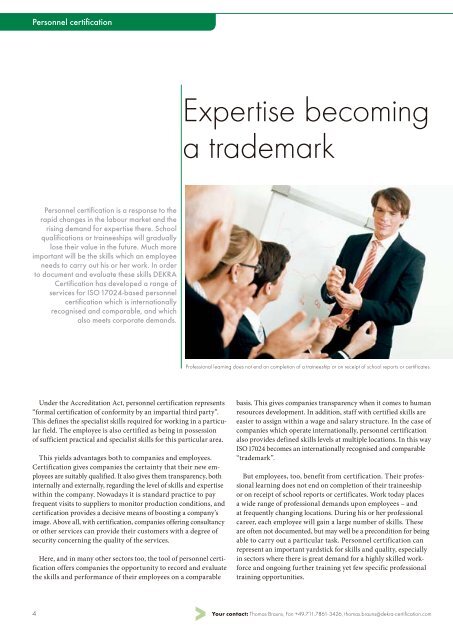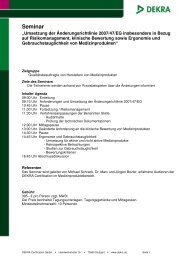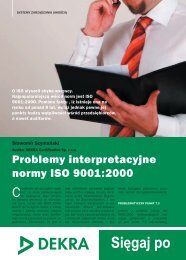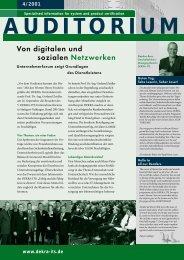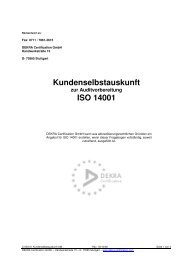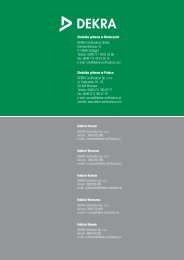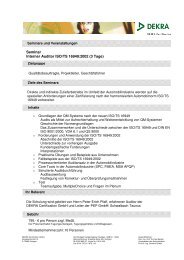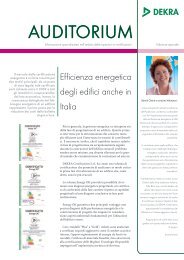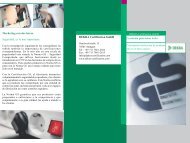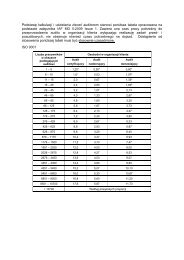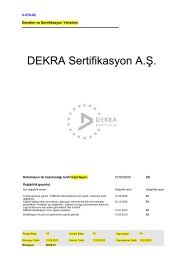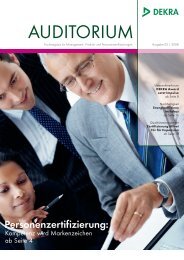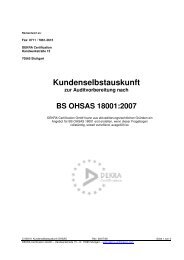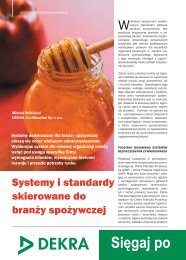AUDITORIUM - Dekra
AUDITORIUM - Dekra
AUDITORIUM - Dekra
You also want an ePaper? Increase the reach of your titles
YUMPU automatically turns print PDFs into web optimized ePapers that Google loves.
Personnel certifi cation<br />
Expertise becoming<br />
a trademark<br />
Personnel certification is a response to the<br />
rapid changes in the labour market and the<br />
rising demand for expertise there. School<br />
qualifications or traineeships will gradually<br />
lose their value in the future. Much more<br />
important will be the skills which an employee<br />
needs to carry out his or her work. In order<br />
to document and evaluate these skills DEKRA<br />
Certification has developed a range of<br />
services for ISO 17024-based personnel<br />
certification which is internationally<br />
recognised and comparable, and which<br />
also meets corporate demands.<br />
Professional learning does not end on completion of a traineeship or on receipt of school reports or certificates.<br />
Under the Accreditation Act, personnel certification represents<br />
“formal certification of conformity by an impartial third party”.<br />
This defines the specialist skills required for working in a particular<br />
field. The employee is also certified as being in possession<br />
of sufficient practical and specialist skills for this particular area.<br />
This yields advantages both to companies and employees.<br />
Certification gives companies the certainty that their new employees<br />
are suitably qualified. It also gives them transparency, both<br />
internally and externally, regarding the level of skills and expertise<br />
within the company. Nowadays it is standard practice to pay<br />
frequent visits to suppliers to monitor production conditions, and<br />
certification provides a decisive means of boosting a company’s<br />
image. Above all, with certification, companies offering consultancy<br />
or other services can provide their customers with a degree of<br />
security concerning the quality of the services.<br />
Here, and in many other sectors too, the tool of personnel certification<br />
offers companies the opportunity to record and evaluate<br />
the skills and performance of their employees on a comparable<br />
basis. This gives companies transparency when it comes to human<br />
resources development. In addition, staff with certified skills are<br />
easier to assign within a wage and salary structure. In the case of<br />
companies which operate internationally, personnel certification<br />
also provides defined skills levels at multiple locations. In this way<br />
ISO 17024 becomes an internationally recognised and comparable<br />
“trademark”.<br />
But employees, too, benefit from certification. Their professional<br />
learning does not end on completion of their traineeship<br />
or on receipt of school reports or certificates. Work today places<br />
a wide range of professional demands upon employees – and<br />
at frequently changing locations. During his or her professional<br />
career, each employee will gain a large number of skills. These<br />
are often not documented, but may well be a precondition for being<br />
able to carry out a particular task. Personnel certification can<br />
represent an important yardstick for skills and quality, especially<br />
in sectors where there is great demand for a highly skilled workforce<br />
and ongoing further training yet few specific professional<br />
training opportunities.<br />
4<br />
><br />
Your<br />
contact: Thomas Brauns, Fon +49.711.7861- 3426, thomas.brauns@dekra-certification.com


